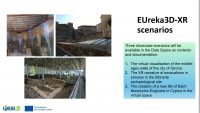Refers to the unequal distribution of and access to information and communication technologies, as well as the unequal participation in the knowledge society as afforded by the use of communication technologies. Patterns of inequality can be associated with social class, gender, economic status, and geographic areas among other factors. The concept of ‘digital divide’ has been studied extensively and evolved from an initial meaning associated strictly with physical access to technology, to a more elaborate meaning in which associations are drawn with patterns of social inequality and social exclusion on virtue of racial, ethnic, and economic differences.
-
Join the
Digital Meets Culture
Newsletter! -
Join the
Digital Meets Culture
Open Newsroom! If you have interesting news and events to point out in the field of digital cultural heritage, we are waiting for your contribution.
If you have interesting news and events to point out in the field of digital cultural heritage, we are waiting for your contribution.
-
Free text
-
-
Upcoming events
-
 Siena (Italy), 8-13 September 2025
Siena (Italy), 8-13 September 2025 As the leading global event on digital technology for documenting, conserving, and sharing heritage—from landscapes and monuments to museums, collections, and intangible traditions—the Digital Heritage International Congress offers a unified stage for major world conferences, workshops, and exhibitions. … Continue reading →
 online on 22-23 July 2025. The deadline for proposals is 31 March 2025.
online on 22-23 July 2025. The deadline for proposals is 31 March 2025.The Museum Digital Summit will take place online 22-23 July 2025. MuseumNext is a global conference series on the future of museums. Over the past 12 months the events have brought together more than 20,000 museum professionals for their … Continue reading →



































